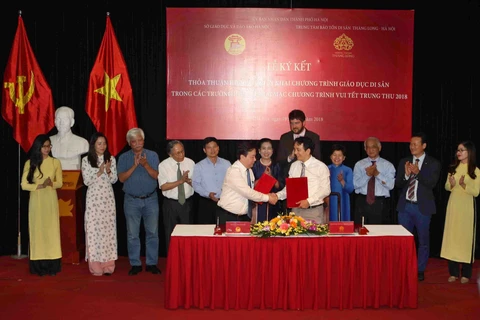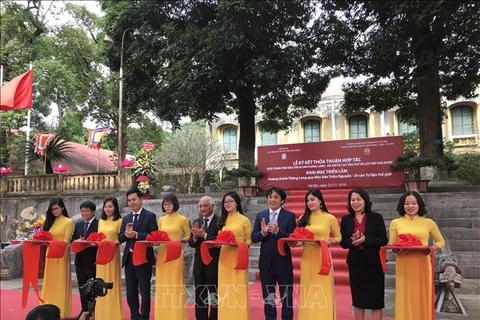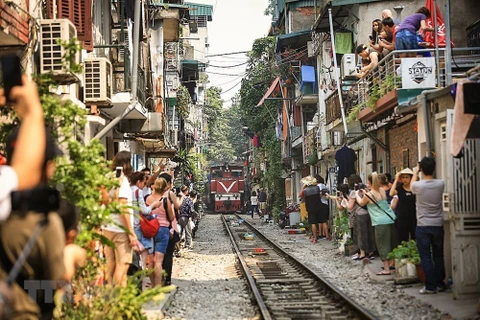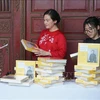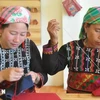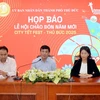 Thang Long Imperial Citadel, the venue for conferences on preserving historical sites held under the framework of Italian Design Day. (Photo: hoangthanhthanglong.vn)
Thang Long Imperial Citadel, the venue for conferences on preserving historical sites held under the framework of Italian Design Day. (Photo: hoangthanhthanglong.vn) Hanoi (VNS/VNA) - Protecting cultural assets and creating spaces for community activity were some solutions given during the Cities of the Future and Heritage Preservation conferences, organised in the framework of Italian Design Day (IDD) 2019.
This year, the Italian Embassy hosted IDD on March 20 and 21. Vietnamese and international architects, experts and businesses offered suggestions on how to preserve and promote the values of Hanoi and cities in the world.
The main event of IDD took place at the UNESCO-recognised Imperial Citadel in Hanoi. Experts discussed how urban development and cultural heritage can be combined to build a smart city of the future, which would also generate and sustain tourism.
Italian Ambassador to Vietnam Antonio Alessandro said design is an essential component of the Italian culture and way of living.
He also introduced architect Michele De Lucchi, Ambassador of Italian Design 2019. De Lucchi travelled to Vietnam to attend workshops at various universities.
“Hanoi, like other cities in Vietnam and the world, is facing the challenge of protecting its strong cultural identity while responding to the needs of rapid urban growth,” said Ambassador Alessandro.
“Through the conferences and discussions, we can say that, yes, urban development and cultural heritage can fruitfully coexist. That is the Italian vision for ‘cities of the future’ and we are eager to work with the city of Hanoi on this.”
Michael Croft, head of the UNESCO Office in Hanoi, said the city has accumulated a reservoir of cultural resources through its historical experiences, which are deeply embedded in its culture.
Croft said heritage and development are not enemies, but natural friends.
“I say this because UNESCO places great importance on the application of culture as a fundamental tool for urban development, enhancing the sustainability – which includes the liveability – of cities,” he said.
He said creative industries form an integral part of sustainable urban development for a number of reasons.
“Creative industries also play a vital role in the economic development of cities by creating pathways for job creation and encouraging urban regeneration,” Croft said.
“Galleries, artist studios, craft shops, design studios as well as restaurants and cafés may form a vibrant and attractive neighbourhood.”
“This is why the approach to a city’s cultural assets is as important as the management of its physical assets,” he said.
“More than any other city, Hanoi represents the diversity of Vietnamese history and culture, and thus it represents the nation.
“Today, it is a capital growing in confidence and ambition, engaged internationally – visited by millions of tourists each year. We have we have an opportunity to do something at scale, to conceive of not just a creative city, but a creative capital, a sustainable capital, backed by a creative economy.”
Famous heritage sites can be protected against damage from the weather and ageing thanks to innovative technologies including new paints and coatings.
Pamela Phua, general director of AkzoNobel Paints Vietnam, said innovative coatings can be highly effective in protecting structures – even ancient heritage sites, for which preserving the aesthetic is critical.
“By collaborating with many different parties including international institutional partners as well as local government authorities, AkzoNobel is committed to hugely supporting the revitalisation of Vietnamese historical heritages nationwide,” she said.
Luigi Croce, Chairman of the Venice Architects Association, shared his own experiences in heritage preservation in Italy and said he hopes to work with Vietnamese developers and businesses to build a master plan for preserving heritage sites during the new wave of development.
“Heritage preservation is more than just ‘keep history alive’; it revitalises the local economy and builds that sense of belonging, pride and identity to the country,” Croce said. “In Italy, we have gained various successes in preserving symbolic structures by reusing and adapting them to modern necessities.”
Pham Tuan Long, Vice Chairman of the Hoan Kiem district People’s Committee, said heritage preservation requires a joint effort from all sectors.
“Heritage preservation is meaningful not only to cultural and economic growth but also to the identity of the nation,” Long said. “I’m glad to see enterprises like AkzoNobel are collaborating with developers to work on innovative technologies in preserving and rebuilding those structures, bringing more value to the community.”
The first IDD was held in 2017 by the Italian Ministry of Foreign Affairs and International Cooperation. It takes place annually in more than 100 cities around the world with the aim of raising awareness on the importance of design, celebrating the great masters of the past and debating contemporary trends and issues.-VNS/VNA
VNA
